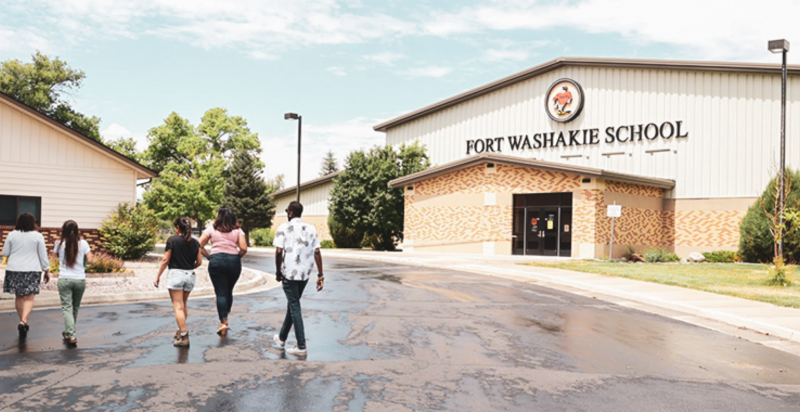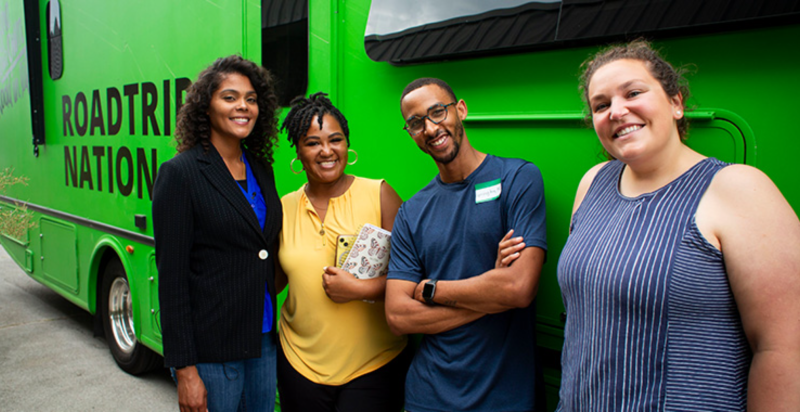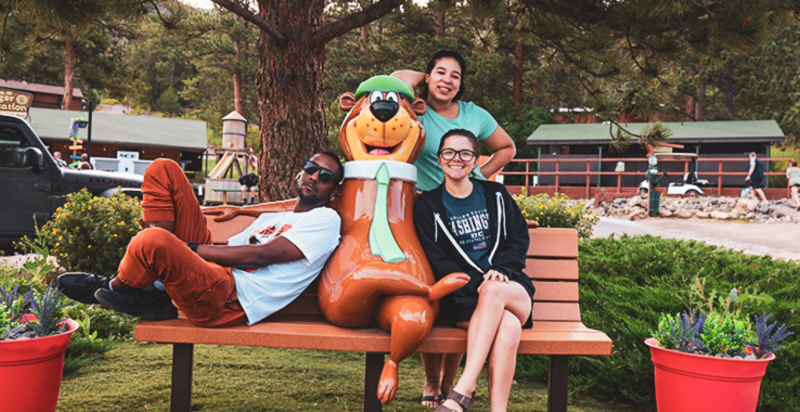—
For more information about the documentary, contact:
Dan Ford
949-764-9121
dford@roadtripnation.org
Roadtripper Bios
Darlene
32, Boston, MA
For the last seven years, Darlene has been teaching at a bilingual school in the heart of the Boston community that raised her. Her former teachers have become her current coworkers. She’s seen firsthand how important it is for students—and their parents—to have the same sense of belonging that she did in the education system while growing up. She’s eager to learn how she can help parents and other community members support their children’s education at home.
Brandon
31, Cheverly, MD
Brandon spent his early twenties trying out different things. After dabbling in graphic design and marketing, he started teaching swim lessons and quickly realized he was called to be an educator. He’s now been a junior high English teacher for the last half decade, and he’s proud to teach kids in the same community he grew up in. Since attaining his master’s in culturally responsive teacher leadership, he aspires to learn how he can effectively bridge gaps for students and their families when it comes to understanding behavior and social-emotional learning from a socioeconomic and cultural perspective.
Carli
22, Lancaster, WI
Carli has been teaching math and financial literacy to high schoolers for the last year. She loves being involved in her community and attends her students’ extracurricular activities often. She believes showing her students support outside the classroom is essential to building trust and relationships with them in general. Unfortunately, she’s found many of her students’ parents aren’t very plugged into their education. She’s hopeful she can learn some valuable strategies to engage families in their children’s learning as a result of this trip
Robin
28, Wasilla, AK
Robin is a former marine scientist who has been teaching science, math and digital media to Alaskan middle and high schoolers for the last seven years. A lot of her students are from the foster care system, indigenous populations, moving from rural villages or struggling economically. She does her best to be creative in engaging her students by providing mental and emotional support, encouraging parental involvement, facilitating peer to peer mentorship, and doubling as a cheerleader for activities and athletics. She just got her principal license, so she’s also eager for this trip to help her gain the confidence to implement and encourage new methods for student success beyond her own classroom on a schoolwide level.
Barrington
29, Los Angeles, CA
Barrington has been teaching third grade for just shy of a decade. He feels an immense amount of responsibility as a man of color to set a good example for the black and brown boys he teaches. After working in the Baltimore and Philadelphia public school systems, he moved back to his hometown of Los Angeles. About 33% of his students are either houseless or experiencing housing insecurity. His goal is to redefine what it means to be a male teacher in education and be the teacher he wished he could have had when he was growing up. He hopes this trip will provide clarity and open up possibilities as to where he can have the most impact.
Katerra
34, New Orleans, LA
Katerra tried a lot of different things before she became a special education teacher. She got a master’s in law, worked as a paraprofessional, and spent some time as a flight attendant. After joining the nonprofit Build On, she did stints in both the Peace Corps and Teach for America that inspired her to turn her attention and talents to a career in education. Her own life is a testament to the importance of well-rounded experience, and she believes every child deserves the opportunity to explore and develop each part of themselves too. She is looking to discover how she can learn how to care for herself just as well as she cares for her students.
Featured Leaders and Locations
Karen Sanchez-Griego
Superintendent, Cuba Independent School District, Cuba High School
Cuba, NM
T’erra E’stes
Founder, Teach Not Punish
Tulsa, OK
Tony Weaver, Jr.
Writer & Influencer, Weird Enough Productions
Apex, NC
Kathryn Procope
Executive Director, Howard University Middle School of Mathematics and Science
Cambridge, MA
Debra Smith
Superintendent, Fremont County School District
Fort Washaki, WY
Jimmy Lee Day II
Band & Orchestra Teacher, East Middle School
Aurora, CO
Travis Allred
Early Learning Project Manager, Envision Utah
Salt Lake City, UT
Val Teichert
Licensed Drug and Alcohol Counselor, The Family Support Center
Winnemuca, NV
Gina Martinez-Keddy
Executive Director, Parent Teacher Home Visits
Sacramento, CA
Rachelle Rhodes
Parent, Family and Child Empowerment Services (FACES)
San Francisco, CA
Support for Roadtrip Nation: Education’s Future provided by Carnegie Corporation of New York, Strada Education Foundation, and Chan Zuckerberg Initiative
Distributor: American Public Television (APT)
Presenting Station: KQED, San Francisco
Websites and Social Media
“Education’s Future”:
roadtripnation.com/roadtrip/education-teachers-families-documentary
roadtripnation.com/roadtrip/education-student-success-documentary
Roadtrip Nation:
roadtripnation.com
x.com/RoadtripNation
facebook.com/RoadtripNation
instagram.com/roadtripnation
youtube.com/roadtripnation
About APT
American Public Television (APT) is the leading syndicator of high-quality, top-rated programming to the nation’s public television stations. Founded in 1961, APT distributes 250 new program titles per year and more than one-third of the top 100 highest-rated public television titles in the U.S. APT’s diverse catalog includes prominent documentaries, performance, dramas, how-to programs, classic movies, children’s series and news and current affairs programs. Midsomer Murders, America’s Test Kitchen, AfroPoP, Rick Steves’ Europe, Pacific Heartbeat, Christopher Kimball’s Milk Street Television, The Indian Doctor, Legacy List with Matt Paxton, Lidia’s Kitchen, Kevin Belton’s New Orleans Kitchen, Simply Ming, The Best of the Joy of Painting with Bob Ross, Front & Center, James Patterson’s Kid Stew and NHK Newsline are a sampling of APT’s programs, considered some of the most popular on public television. APT also licenses programs internationally through its APT Worldwide service and distributes Create®TV — featuring the best of public television’s lifestyle programming — and WORLD™, public television’s premier news, science and documentary channel.


